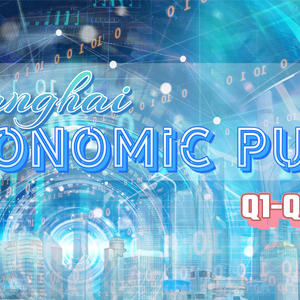by YANG Shuhongji
Private enterprises are playing an increasingly significant role in Shanghai's economic structure, driving both industrial output and foreign trade growth.
According to data released by the Shanghai Municipal Bureau of Statistics on October 22, the total industrial output of large-scale private firms rose 9.8% in the first three quarters of 2025, outpacing the citywide average by 4.1 percentage points. From January to August, the operating revenue of large-scale private firms in the service sector increased 9.5%, 1.8 percentage points faster than the citywide average for large-scale service enterprises.
Foreign trade has been another standout. Private firms' imports and exports surged 27.1% year on year to 1.32 trillion yuan (US$182 billion), accounting for nearly 40% of Shanghai's total trade—up 6.7 percentage points from a year earlier. Their contribution to overall trade growth reached 164.5%, with the number of private firms engaged in import and export rising 8.2% to 46,000.
"The rise of Shanghai's private economy is no accident—it's the result of multiple structural shifts," said ZHAN Yubo, a researcher at the Shanghai Academy of Social Sciences, in an interview with Jiemian News. He noted that the city's industrial structure is moving away from capital-intensive sectors like steel and petrochemicals toward high-tech and emerging industries, where private enterprises have been quick to seize opportunities.
"In fields such as artificial intelligence and new energy, private firms have leveraged innovation and flexible operations to gain market dominance," Zhan said.

Several Shanghai-based private companies have expanded rapidly overseas.
Medical imaging manufacturer United Imaging Healthcare reported overseas revenue of 1.14 billion yuan in the first half, up 22.5% year on year, with foreign markets contributing nearly 19% of its total revenue. The company said demand for its high-end products remains strong.
In the cultural sector, nearly half of the 16 video games selected as China's 2025–2026 key cultural export projects are developed by Shanghai studios, including Battle of Balls by Giant Network, Mobile Legends: Bang Bang by Moonton Technology, Love and Deepspace by Paper Games, Arknights by Hypergryph, and Genshin Impact by miHoYo.
Zhan noted that while foreign-invested enterprises once dominated Shanghai's exports, their share has declined amid global trade tensions, leaving room for private firms to rise. Many have gained an edge through cross-border e-commerce platforms and overseas warehouses.
Private players in green energy are also going global. In Kazakhstan's Ulytau region, Shanghai-based Universal Energy's 100 MW Mezgilder Qushteri wind power project began full-capacity operation this year—the first of its kind in the area. The company said global demand for clean energy is creating new opportunities for Chinese firms to export equipment and expertise along the renewable energy supply chain.
Policy support has further strengthened the trend. Shanghai's Regulations on Promoting the Private Economy, effective October 20, include 88 articles across 11 chapters aimed at improving market access, ensuring fair competition, and protecting the rights of private enterprises.
"The government should continue expanding its policy toolkit—through special funds, tax incentives, and overseas service platforms—to help private enterprises secure a solid foothold in emerging markets such as ASEAN, Belt and Road countries, and the Middle East," Zhan said.





